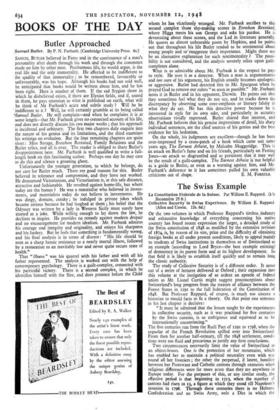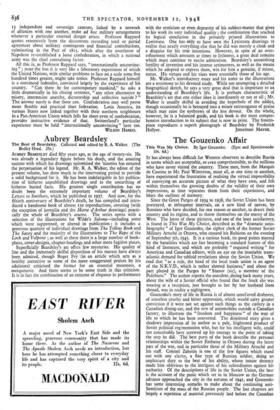The Swiss Example
Collective Security in Swiss Experience. By William E. Rappard (Allen and Unwin. 12s. 6d.)
Or, the two volumes in which Professor Rappard's tireless ,industry and exhaustive knowledge of everything concerning his, native
country has found recent expression the larger a detailed study of
the Swiss constitution of 1848 as modified by the extensive revision of 1874, is, by reason of its size, price and the difficulty of obtaining foreign books at all under present conditions, likely to appeal mainly
to students of Swiss institutions in themselves or of Switzerland as an example (according to Lord Bryce—the best example existing)
of democracy in its purest form and at its highest development. In that field it is likely to establish itself quickly and to remain long the classic authority.
The study of Collective Security is of a different order. It arose out of a series of lectures delivered at Oxford ; their expansion into this volume at the instigation of so ardent an apostle of federal
union as Mr. Lionel Curtis might suggest preconceptions about Switzerland's long progress from the treaties of alliance between the Forest States in 1291 to the full federation of the Constitution of 1848. But Professor Rappard, of course, is much too sincere a historian to mould facts to fit a theory. On that point one sentence
in his last chapter is decisive: " It must be admitted that the lesson taught by the experiments in collective security, such as it was practised for five centuries by the Swiss cantons, is so ambiguous and equivocal as to be internationally unconvincing."
The five centuries run from the Rutli Pact of 1291 to 1798, when the sequelae of the French Revolution spilled over into Switzerland. From then for another half-century, till the 1848 settlement, condi- tions were too fluid and precarious to justify any firm conclusions.
Two circumstances necessarily limit the value of Switzerland as an object-lesson. One is the protection of her mountains, which has enabled her to maintain a political neutrality even with war round all her frontiers ; the other the perpetual, if latent, hostility between her Protestant and Catholic cantons through centuries when religious differences were fir more acute than they are anywhere in Europe today. For the purposes of this, or any similar study, the effective period is that beginning in 1513, when the number of cantons had risen to 13, a figure at which they stood till Napoleon's invasion in 5798. Through these centuries there is no Helvetic Confederation and no Swiss Army, only a Diet in which the 13 independent and sovereign cantons, linked by a network of alliances with one another, make ad hoc military arrangements whenever a particular external danger arises. Professor Rappard quotes. extensively 'from the documents recording total or partial agreement about military contingents and financial contributions, culminating in the Pact of 1815, which after the overthrow of Napoleon re-established a loose confederation, in which a national army was the chief centralising factor.
All this is, as Professor Rappard says, " internationally unconvinc- ing " • none the less it is very like a laboratory experiment of which the United Nations, with similar problems to face on a scale some five hundred times greater, might take notice. Professor Rappard himself is a convinced federalist, convinced largely by the experience of his country. " Can there be for contemporary mankind," he asks a little dramatically in his closing sentence, any other alternative to misery, internecine anarchy, dictatorship and collective suicide ? " The answer surely is that there can. Confederation may well prove more flexible and practical than federation. Latin America, its various States now linked together with their northern neighbours in a Pan-American Union which falls far short even of confederation, provides instructive evidence of that. Switzerland's particular experience must be held " internationally unconvincing " here too.
WILSON HARRIS.



































 Previous page
Previous page